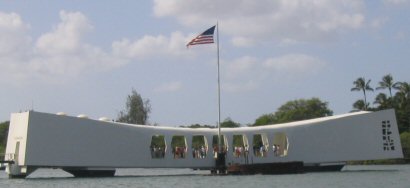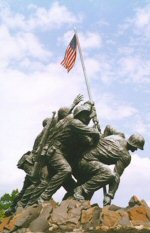Thanksgiving and Pearl Harbor Day
My mother was just 20 years old when Japan attacked Pearl Harbor on December 7th 1941. She often talked about the horror of that day. Eventually, she enlisted in the army where she served honorably for 27 months.
On November 21, 2003, my wife and I visited the USS Arizona National Memorial in Pearl Harbor. Here are some of my thoughts and pictures. (Note: only the three full-width pictures are my own.) First, we boarded a Navy shuttle boat for the 10-minute trip across Pearl Harbor to the USS Arizona National Memorial. The Memorial stands crosswise to and above the sunken battleship USS Arizona. After about 30 minutes inside the Memorial, we went back to shore on another Navy shuttle boat. It has been four years now, and I still can't find the words to fully express what I felt that day. Nearly 2,400 lives were lost in that attack, almost half of them on this one ship. Many of the 1,177 crewmen who died on the Arizona are still entombed in its sunken remains. It is truly a hallowed place. We visited the shrine room inside the Memorial, where the names of those killed on the Arizona are engraved on a marble wall. We looked out into the water where oil from USS Arizona is still leaking to the surface. I had many thoughts. But one thought that kept running though my mind was this: "If only President Franklin D. Roosevelt, who had foreknowledge of the attack, had picked up the phone and called Pearl Harbor. Granted, it would not have prevented the attack, but our men would not have been such sitting ducks and many lives would have been saved." I admit, these are unpleasant thoughts. Some would say they are heretical. Why would I even think such a thing? I want to tell you why. In 1986, The New American magazine published an article titled "Pearl Harbor—Hawaii was surprised; Washington was not." It is a long article (9,358 words) and it is well documented. This article convinced me 21 years ago that our political leaders in Washington knew in advance of the attack and deliberately withheld its foreknowledge from our commanders in Hawaii. And for me that is the real reason why December 7th 1941 is a day that will live in infamy. In fact, it is a day of two infamies—one an act of war that is universally acknowledged and the other a viscious and treasonous act that has been kept hidden to protect the guilty. What makes this New American article even more compelling for me is that, the same year it was published, Church President Ezra Taft Benson purchased subscriptions to The New American for his Counselors President Hinckley and President Monson, and wrote to the magazine's editor, "Congratulations on a job well done. I am deeply grateful for The New American. May the good Lord sustain you and bless you as you enjoy your work as editor. The magazine is needed and so are you. With every good wish. Faithfully, your friend and brother, Ezra Taft Benson, President." More than once, President Benson recommended The New American, formerly American Opinion, to Church members (see Conference Report, Oct. 1962, Era, Dec. 1962, p. 912; the Church News, Feb. 26, 1966, p.12; An Enemy Hath Done This, p.44; and Title of Liberty, pp.72 and 99). I strongly urge you to click here and read the entire article for yourself. As you read it, keep in mind President Ezra Taft Benson's endorsement of the magazine in which it was printed. The article is not pleasant reading, but it is the truth and we should not be afraid of the truth. There was another thought that kept running through my mind. Above the Memorial was a beautiful United States Flag waving in the breeze. I kept thinking of what happened on February 23, 1945 when a U.S. Flag was raised on Mount Suribachi at Iwo Jima. This event is depicted by the Marine Corps War Memorial in Arlington, Virginia. While the statue depicts one of the most famous incidents of World War II, the memorial is dedicated to all Marines who have given their lives in the defense of the United States since 1775. I thought how in every conflict since the American Revolutionary War, our troops have raised our flag over territory taken from the enemy—every conflict, that is, until the present one. On March 21, 2003, exactly eight months before my Pearl Harbor visit, a U.S. Marine proudly raised the Stars and Stripes above the main port at Umm Qasr after an intensive firefight with Iraqi forces. The very next day, on orders from back home, the Stars and Stripes were taken down. The flag is often displayed in support of our troops. Those who enlist in the military literally rally around our flag. They deserve to fight under that flag. However, Operation Iraqi Freedom is the first war in American history in which Americans have been ordered to fight NOT beneath the Stars and Stripes. In his 1821 Independence Day address, John Quincy Adams said: "[America] is the well-wisher to the freedom and independence of all, [but] she is the champion and vindicator only of her own. She well knows that by once enlisting under other banners than her own, were they even the banners of foreign independence, she would involve herself beyond the power of extrication, in all the wars of interest and intrigue ... which assume the colors and usurp the standard of freedom." (As quoted in William Norman Grigg, "Rallying ’Round What Flag?," The New American, April 21, 2003.) I agree with William Norman Grigg's assessment: "As brave Americans fight and die for an unspecified Iraqi flag in ' Operation Iraqi Freedom,' Adams' shamefully ignored admonition has become a tragic prophecy." (Ibid.) While we are observing Thanksgiving Day today, let us remember what President Benson said about its relationship to Pearl Harbor Day: "In America, two days of historical significance to our country are observed closely together—Thanksgiving Day and Pearl Harbor Day. One serves to keep us ever mindful of the blessings that are ours. The other is a brutal reminder that these blessings cannot be taken for granted; they must be protected." (Teachings of Ezra Taft Benson, p.581.) And let us remember to be thankful for and ask God's choicest blessings on our troops.



